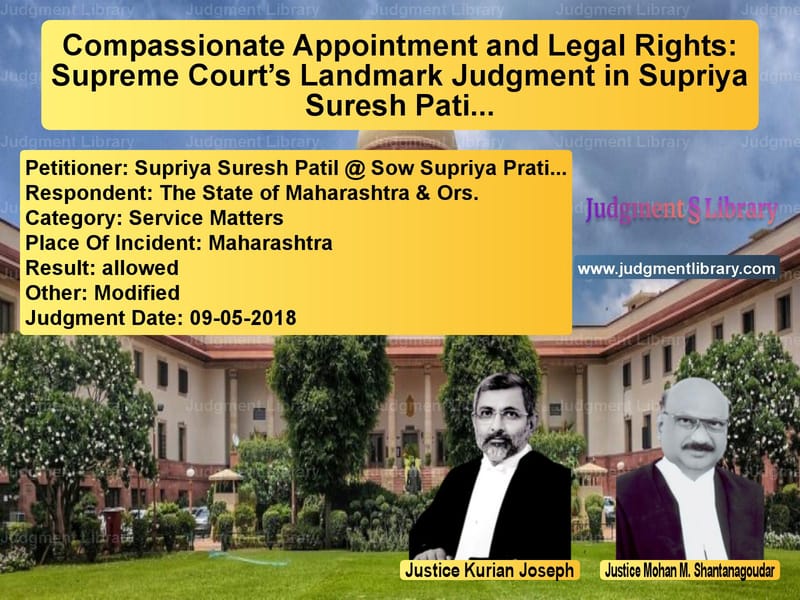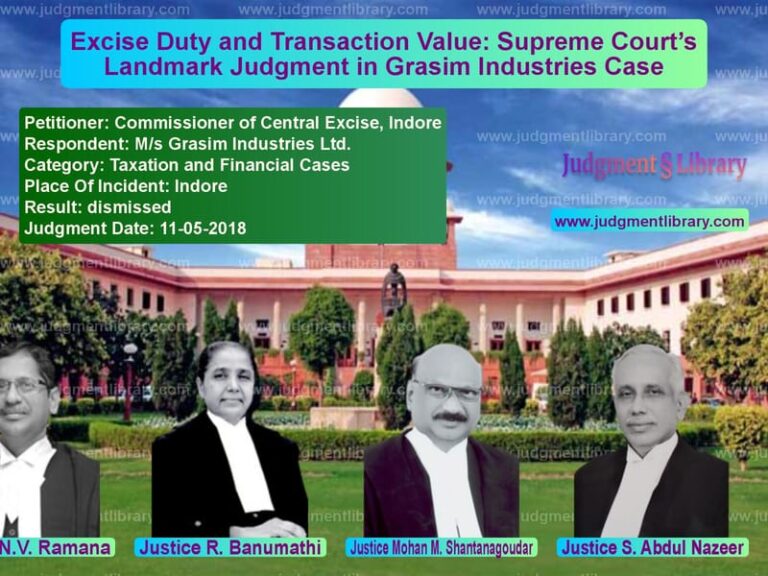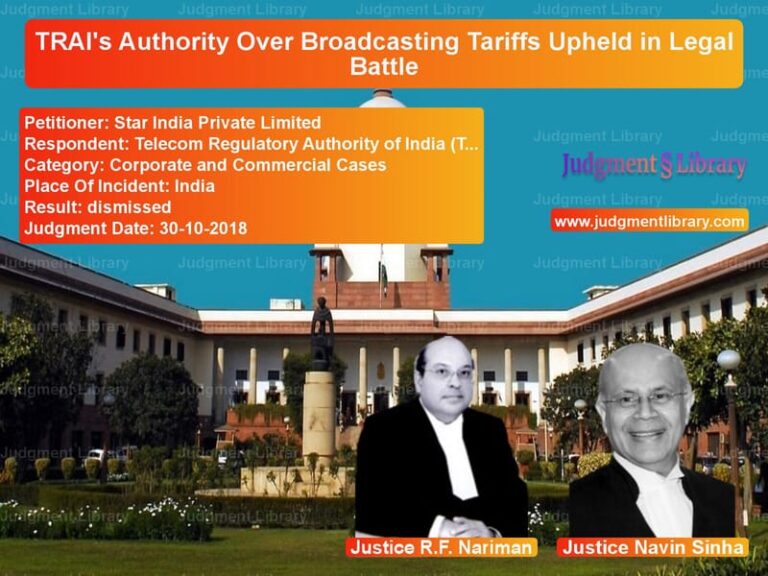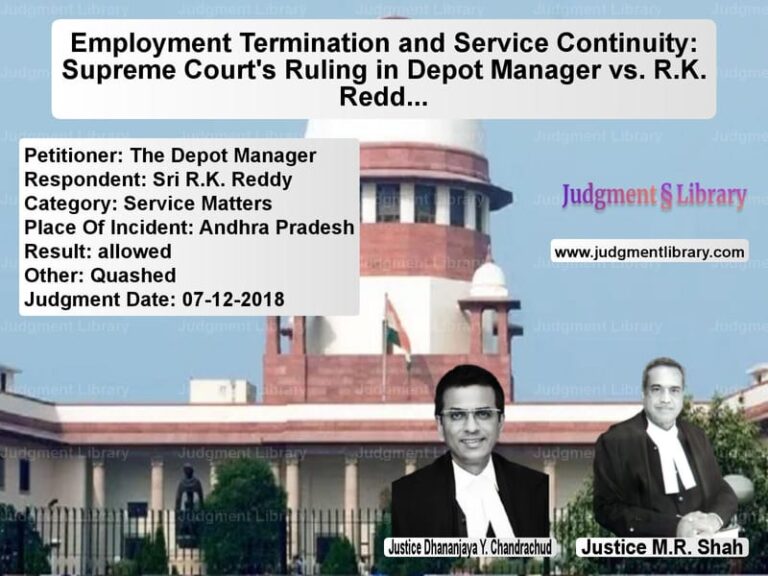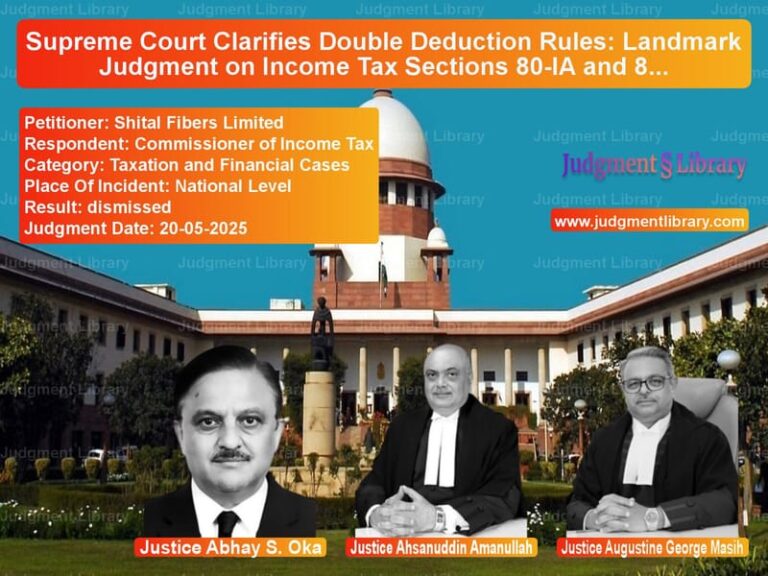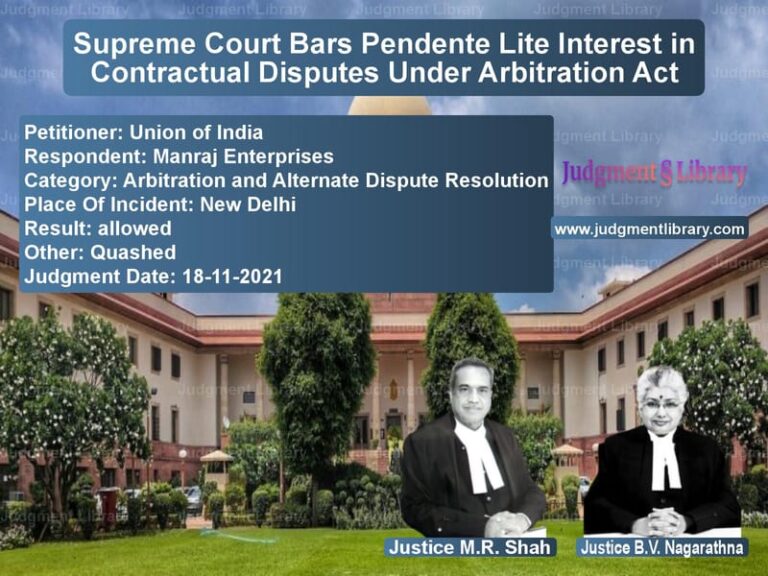Compassionate Appointment and Legal Rights: Supreme Court’s Landmark Judgment in Supriya Suresh Patil Case
The case of Supriya Suresh Patil @ Sow Supriya Pratik Kadam v. The State of Maharashtra & Ors. revolves around the issue of compassionate appointment, a scheme designed to provide financial security to families of deceased government employees. The Supreme Court examined whether the rejection of the appellant’s application for compassionate employment based on the passage of time was legally justified. The Court ultimately ruled in favor of the appellant, emphasizing that the delay in applying should not be the sole ground for rejection, particularly when financial hardship continues to persist.
Background of the Case
The appellant’s father was a government employee who passed away while in service. Following his death, the appellant’s mother applied for a government job under the compassionate appointment scheme. However, due to exceeding the prescribed age limit, her request was denied. Subsequently, the appellant applied for the same relief, arguing that her family remained in financial distress even after ten years of survival without a government job.
The Maharashtra government authorities rejected her request, citing that the family had managed to sustain itself for over a decade. The Bombay High Court upheld this rejection, reasoning that the scheme was designed for immediate financial relief and not for long-term sustenance.
Key Legal Issues
The Supreme Court was tasked with answering the following critical legal questions:
- Does the mere passage of time disqualify a candidate from seeking compassionate employment?
- What should be the primary consideration—immediate hardship at the time of the employee’s death or the continuing financial distress faced by the family?
- Does the rejection of a compassionate appointment application solely based on elapsed time violate the principles of social justice?
- Can the Supreme Court exercise its discretionary powers under Article 142 to grant relief in special circumstances?
Arguments by the Petitioner
The petitioner, Supriya Suresh Patil, made the following submissions:
- Her family continued to struggle financially despite surviving for ten years after her father’s death.
- The compassionate appointment scheme is intended to provide financial assistance to families of deceased government employees who are unable to sustain themselves.
- The rejection of her application was based on a rigid interpretation of the time factor, without considering the family’s ongoing economic difficulties.
- Her mother had already been empaneled for appointment, but she was later disqualified due to age restrictions, leading to an unfair denial of relief.
Arguments by the Respondent
The State of Maharashtra contended that:
- The compassionate appointment scheme is not a vested right but a discretionary relief granted under specific circumstances.
- Compassionate employment is intended as an emergency relief mechanism, not a guarantee of employment for surviving family members at any future stage.
- The family had survived for ten years without a government job, which indicated that they were not in immediate financial distress.
- The rejection of the appellant’s request was in line with government policies, which prioritize timely applications over delayed claims.
Supreme Court’s Observations
The Supreme Court took a pragmatic view of the case, recognizing that financial hardship does not always manifest immediately after an employee’s death but can persist for years. The Court disagreed with the government’s rigid interpretation and made the following key observations:
“The main reason for rejecting the case of the appellant was that the family had managed to survive for over ten years and, therefore, there was no immediate necessity. We are afraid that this cannot be a major reason for rejection.”
The Court emphasized that while compassionate appointment is an exceptional relief rather than a guaranteed right, it must be granted based on an assessment of financial distress rather than a mere time-barred application.
“Whether the family pulled on begging or borrowing also should have been one consideration.”
The Supreme Court pointed out that authorities failed to investigate how the family managed to sustain itself for ten years. Simply because they survived through personal loans, assistance from relatives, or informal work arrangements does not mean they were not in distress.
Final Judgment
The Supreme Court ruled in favor of the appellant and ordered that she be considered for compassionate appointment. The Court exercised its extraordinary jurisdiction under Article 142 of the Constitution to ensure complete justice, stating:
“We make it clear that this order is passed in exercise of our jurisdiction under Article 142 of the Constitution of India for doing complete justice and hence, it may not be treated as a precedent.”
The Court directed the State of Maharashtra to take the necessary steps to process the appellant’s appointment within one month. However, it clarified that the judgment was specific to the peculiar facts of this case and should not be interpreted as a general precedent.
Implications of the Judgment
This landmark ruling has significant implications for compassionate appointment policies across India:
- Assessment of Financial Distress: Government authorities must evaluate the ongoing economic condition of the applicant’s family rather than mechanically rejecting applications based on the passage of time.
- Flexible Application of Rules: The Court reaffirmed that rules related to compassionate appointments should not be interpreted rigidly. Instead, they should serve their intended purpose of providing relief to struggling families.
- Judicial Discretion Under Article 142: The judgment highlights the Supreme Court’s power to intervene in exceptional cases to prevent injustices resulting from the mechanical application of rules.
Conclusion
The Supreme Court’s ruling in Supriya Suresh Patil v. The State of Maharashtra serves as a crucial precedent in labor and employment law. It underscores the importance of ensuring that the compassionate appointment scheme remains an effective tool for providing relief to the families of deceased government employees.
By rejecting the argument that the passage of time alone disqualifies an applicant, the Court has reaffirmed the core principle that compassionate appointments should be based on financial hardship and necessity, rather than arbitrary timelines.
Petitioner Name: Supriya Suresh Patil @ Sow Supriya Pratik Kadam.Respondent Name: The State of Maharashtra & Ors..Judgment By: Justice Kurian Joseph, Justice Mohan M. Shantanagoudar.Place Of Incident: Maharashtra.Judgment Date: 09-05-2018.
Don’t miss out on the full details! Download the complete judgment in PDF format below and gain valuable insights instantly!
Download Judgment: Supriya Suresh Patil vs The State of Maharas Supreme Court of India Judgment Dated 09-05-2018.pdf
Direct Downlaod Judgment: Direct downlaod this Judgment
See all petitions in Employment Disputes
See all petitions in Recruitment Policies
See all petitions in Public Sector Employees
See all petitions in Judgment by Kurian Joseph
See all petitions in Judgment by Mohan M. Shantanagoudar
See all petitions in allowed
See all petitions in Modified
See all petitions in supreme court of India judgments May 2018
See all petitions in 2018 judgments
See all posts in Service Matters Category
See all allowed petitions in Service Matters Category
See all Dismissed petitions in Service Matters Category
See all partially allowed petitions in Service Matters Category

